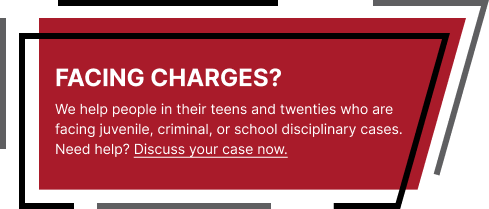

From the moment an officer detains you, whether or not you’ve been read your Miranda rights, there are a handful of things that you absolutely should not do; actions that can constitute major mistakes. Because everything you say may be used against you, these missteps range from things that you might say while being detained or in the immediate aftermath of getting arrested to actions you might take two months after the incident.
If you’ve been detained, arrested, or find yourself in custody, these tips can help guide you toward better decisions. If you find yourself facing charges, or you’ve already committed one of the following mistakes, contact Ghanouni Teen & Young Adult Defense, and we’ll work to mitigate the damage and put you in the best possible position for your case.
1.Talking to Authorities
This is the first thing you should not do. You might think that you can make your situation better by explaining yourself to the police, but generally you’re only making things worse. Even the way you’re speaking, such as slurred or belligerent speech, can be used against you. Another facet of this is making sure you don’t admit anything to the arresting officer or provide any statements to authorities at the station; such statements include anything you say over the phone while in jail.
2. Agreeing to Tests
Before you agree to take any test — such as field sobriety tests, polygraph tests, or chemical tests — you may want to speak to a lawyer. Unfortunately, in many circumstances the police are not required to let you speak to a lawyer before performing field sobriety evaluations or making a decision to take a chemical test for a DUI. Making matters worse, in certain states, including Georgia, refusing to submit to a state administered chemical test can lead to your license automatically being suspended. Speaking with a lawyer can offer clarity on the impact that your consent to take a test can have on your case.
3. Posting Things on Social Media That Hurt Your Case
After you’ve been released, the feeling of liberation can make you feel like celebrating. But until your case is completely resolved, anything you post on social media can negatively impact its outcome. Imagine facing charges for underage drinking or DUI and then posting pictures of yourself at a party. You can claim that you weren’t drinking, but others might say that your recent history says otherwise.
4. Believing Everything the Police Say
In certain situations, the police are allowed to lie to those whom they suspect committed a crime. An example would be the police detaining two people who were in an area where car break-ins were just reported. After separating the two people, the police are within their legal rights to lie to one of the individuals and say that their friend has already given up and talked, so they might as well do the same. This is a classic trick to gather evidence against suspects.
Even if you follow these guidelines, you still have charges to face, and you shouldn’t underestimate them by going through the legal process alone. Our goal is to protect your future by minimizing the impacts the charge has on your future. If you’ve already made one of the above mistakes, we can still work to protect your future. We frequently tell our clients that they shouldn’t focus on what has already happened; instead, they should focus on what they can do moving forward to improve the situation.
If you’ve been arrested and need expert representation, call the experienced attorneys at Ghanouni Teen & Young Adult Defense Firm for a Defense Strategy Meeting. If you aren’t ready to schedule your consultation, then click here to download our complimentary ebook 5 Things Not to Do When You’ve Been Charged with a Crime to learn what you need to know to start protecting your future immediately.
Ghanouni Teen & Young Adult Defense Firm 691 John Wesley Dobbs Ave NE unit 225, Atlanta, GA 30312
Ghanouni Teen & Young Adult Defense Firm 2765 S Main St Suite C-2, Kennesaw, GA 30144
Ghanouni Teen & Young Adult Defense Firm 3826 Highlands Parkway SE, Smyrna, GA 30082
Ghanouni Teen & Young Adult Defense Firm 3227 S. Cherokee Lane, Suite 1360, Woodstock, GA 30188